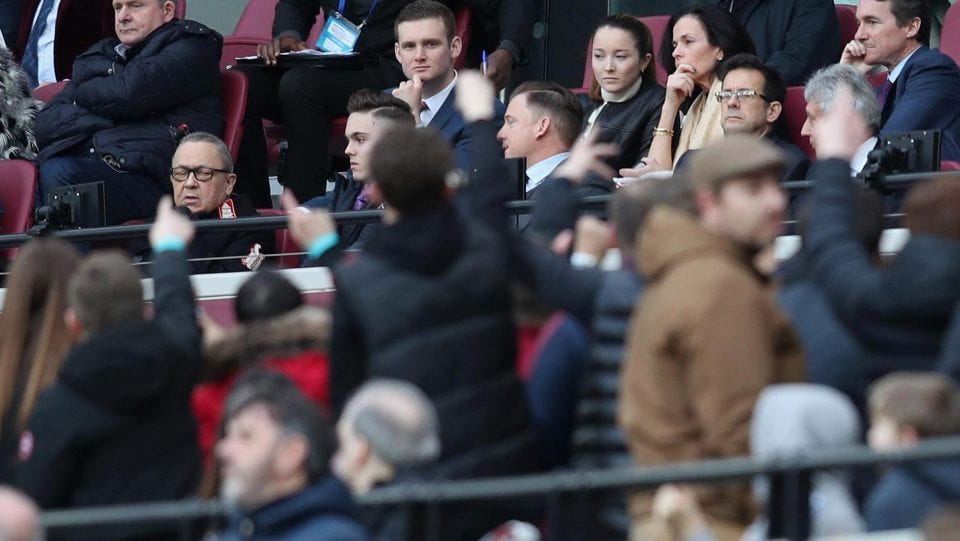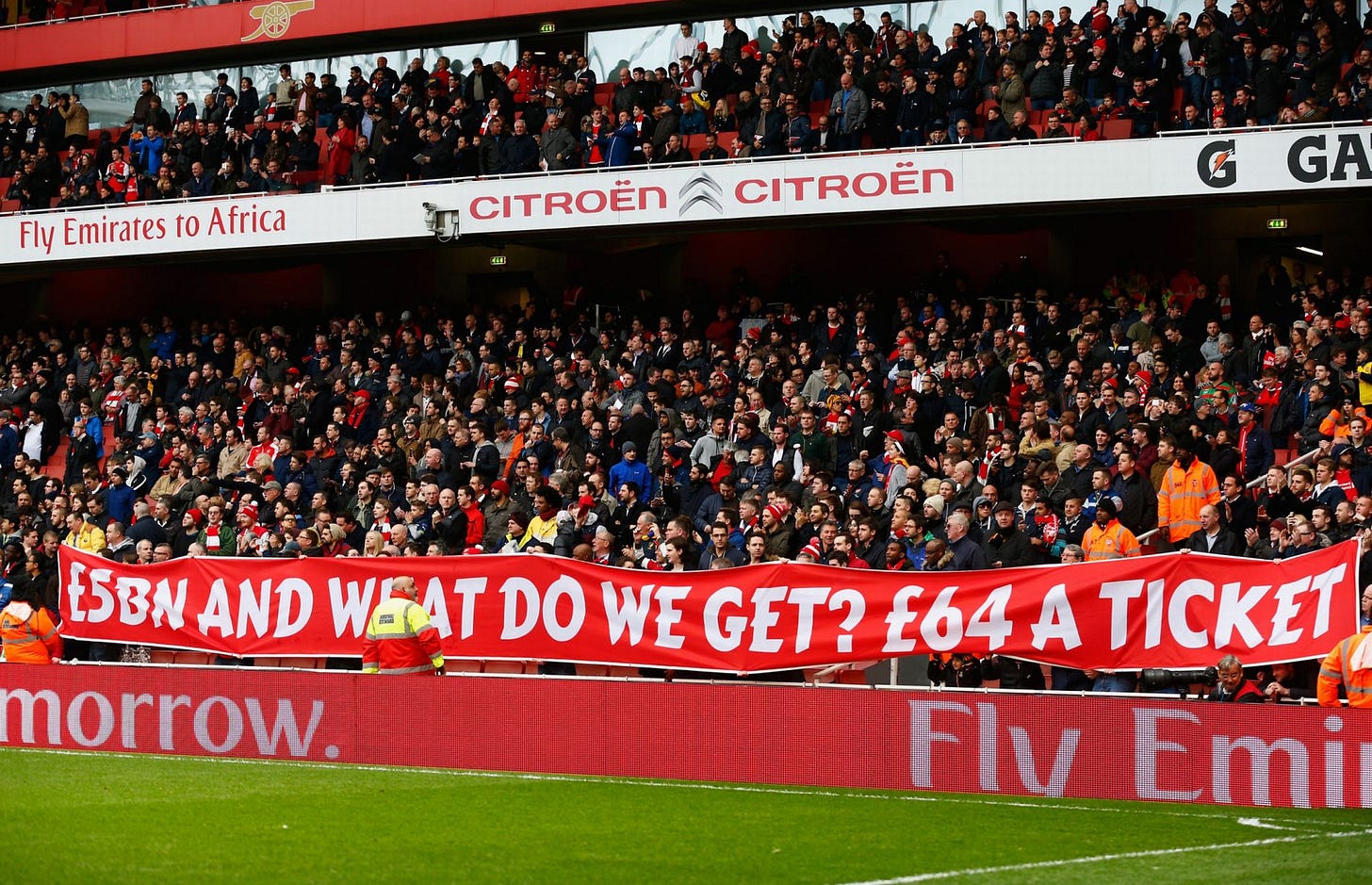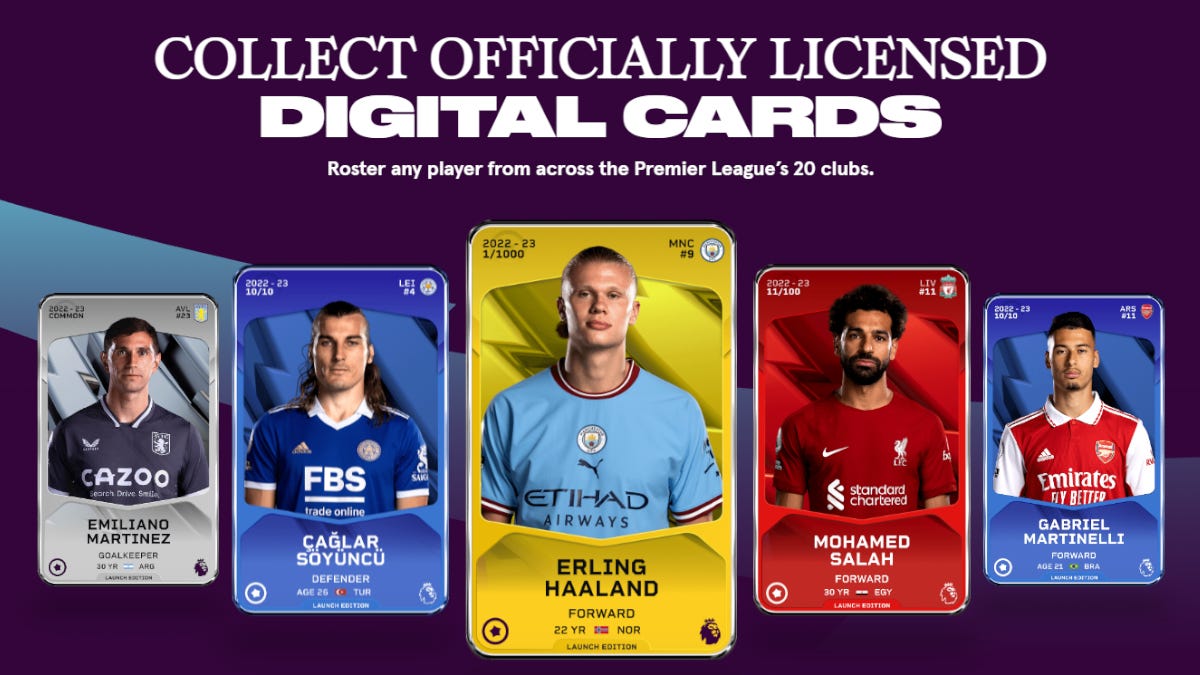'We're not creative enough, we're not positive enough'
Why football clubs need comms strategy
A bit of a departure from usual service, this one. A bit less worky, and a hell of a lot longer, but hopefully interesting and at least somewhat useful. Even if it’s just a big shout into the void writing it has been cathartic and helped me figure out what I think.
If you’re not into football though then fair warning: you’ll get bored. Don’t say you weren’t warned.
Lots of this is synthesis rather than original thought. In particular I’m keen to direct you to the writing of Sam Diss and Kieran Maguire for much more on this, as well as Danny Baker’s 1991 TV programme The Game, which bizarrely helped me put some of the pieces together and is also just a brilliant watch.
Anyway, onwards:
Then like my dreams, they fade and die - I’m Forever Blowing Bubbles
Last year my football team won the first trophy they’ve won in my lifetime. It’s no exaggeration to say it was one of the best days of my life. The night when 30-odd years of hopes, relationships, memories, conversations, train journeys to god-forsaken places, commiseratory drinks in dreadful pubs and stories relayed down the ages all culminated in a single perfect moment. Standing in a tiny stadium in the Czech Republic surrounded by my mates I’d never loved my life - or my football club - more.
8 months on that all feels a long way away. Disaffected and disengaged fans have gone straight back to arguing with one another. What’s going on? We’ve been considerably worse than we are now for most of my life, but fans have rarely been as apathetic.
This isn’t limited to my friends and my club, it’s everywhere. Supporters across the country - from Manchester to Reading to Crystal Palace to Chelsea to Leeds - find themselves at cross-purposes with the clubs they love.
The more I think and read about what’s going on the more I think it’s a logical product of messed up incentives and short-term thinking, but something that’s in every club’s gift to solve. Not only that, those that do solve it will claim proper competitive advantage, and begin to reduce the need to orient every decision they make around their terrifying dependence on TV money.
Still take me back to where my memories remain - Mull of Kintyre
The Premier League has been an incredible money making machine. A big part of its success was its early recognition that while some of the football on show may have been better in Italy or Spain, nowhere could match England for packed, atmospheric, TV-friendly stadiums.
Clubs today are richer than they’ve ever been. The quality of the football you get to watch is incredible, unfathomably good relative to even ten years ago. In all objective terms, Premier League clubs are all at or close to their historical peak of ‘success.’
And yet fans have never been more disaffected. Having sat on it for a while I think this is happening because clubs have forgotten what they really are:
Football clubs are legends; they’re folk stories.
Legends that unfold week-by-week and are retold generation-to-generation. Legends that provide identity and belonging to the people who collectively understand them. They’re usually tied to a place and a community - many of the biggest clubs in the country began life as Victorian works’ teams - and are perpetuated, oxygenated and embellished over generations as parents pass the folk memory onto their children.
These are what provide meaning to the big moments of success and hope during the desperate periods.
They’re the reasons stadiums are packed and noisy even for dead-rubber games between mid-table no-hopers. People are there for the communion, and because the nothing games make the big games more meaningful.
These legends are what the clubs are really selling to the TV networks, the thing every other league wants and none have. In commercial terms, they’re the defendable moat around the Premier League, the thing that can’t be replicated or gazumped by oil billions or venture capital speculation.
Despite all the money they’re generating, football clubs are a house of cards. On average 67% of Premier League club revenue comes from TV rights, a horrifically undiversified revenue stream.
The only guarantee of future revenue is continued on-pitch success, the only dependable indicator of on-pitch success is spend. The clubs are incentivised to spend their income as quickly as possible and with as short-term focus as possible.
But focusing solely on short-term revenue - while entirely rational in each club’s instance - is eroding their relationship with supporters, the thing that’s brought them riches, and the one thing that underpins their chances of collective long-term success.
You’re Everywhere and Nowhere Baby - Hi Ho Silver Lining
The growth of the internet and globalisation of support is changing how fans relate to football.
Responsibility is increasingly falling on clubs to tell their own story, and they’re shit at it.
Because success on the pitch and growth via international audiences are the only things that matter to the decision makers at most football clubs, they seem to be the only thing that matter when you look at club comms.
In lieu of emotion and folk memory there are 20 identikit sets of club social media accounts, following one another like lemmings off a cliff, each endlessly sharing clips of players training and giving score updates from games in-between bits of branded content designed to separate supporters from the contents of their wallets.
In creating for new fans rather than current ones clubs have decided they must abandon - or at least marginalise - the things that tie them to their history. But why is that true? There’s no reason to believe that fans in Seoul or Accra would want to buy into mythology any less than those from Romford or Burnley.
And, frankly, unless you’re one of the half a dozen teams regularly picking up trophies, what else have you got to talk about?
Wrexham are proof of this. The genesis of Wrexham’s enormous global success isn’t success, it’s all story. It’s place, not players. People treat Ryan Reynolds as some sort of Water Diviner, able to make incredible successes of things others couldn’t. He’s not, he just gets that these stories are compelling enough to translate out of their immediate geography, and knows how to tell them.
Prune Juice - Alan Sugar
The Premier League is one of Britain’s most successful exports; the most watched sports league in the world. But the boom is over. The latest round of TV rights were pretty much flat, clubs can’t rely on ever-increasing revenues to inflate today’s spending into insignificance like they used to.
Clubs are rightly looking for ways to diversify revenue streams and reduce dependency on TV money, but their farcically short-sighted commercial focus means they can’t see beyond wringing as much cash out of their existing supporter base as they can, sweating the strength of their historic brands instead of investing to continue growing them.
The matchday experience is being monetised more than ever: Stadiums are being re-engineered to accommodate more executive boxes; season ticket costs are being hiked even if it means clubs ripping off their most loyal supporters; the price of individual match tickets is eye watering; broadcasters continue to build higher paywalls to fund the astronomical cost of rights.
A generation of fans is being priced out, not only from matches but even from watching on the telly.
Football as legend depends on intergenerational perpetuation, but young fans are forced to engage with football from afar: through Fifa or by watching clips on social media. Disposable, ephemeral content instead of the real thing.
Clubs kid themselves that they’re giving young people what they want rather than throwing scraps from the table, but this is obvious tripe. They want what everyone wants: community, something to buy into, something to believe in. They’re being forced to try and find that in the things they can get access to, not vice-versa.
In their place: ‘Tourists’. Fans visiting from overseas, to be monetised but othered. Their cash is welcomed in the shop but their presence less so in the stadium. They are a product of clubs’ exploitation of fans, not the cause, but serve as a useful lightning rod to draw attention away from the boardroom.
Away from matchdays clubs sign all sorts of moody deals to crowbar money out of fans’ wallets: Crypto exchanges, NFT partnerships, my own club got on board for a time with a company called Socios, who attempted to make every element of football supporting transactional.
Where clubs place any value on fans, it’s solely as an entity for commercial exploitation.
The most visible (and audible) result of this are the sanitised atmospheres at matches, the product of a disaffected, ageing set of fans. The erosion of the very thing that set the Premier League apart in the first place.
If the game continues along this road in the medium-term what’s keeping the world’s eyeballs on Anfield rather than Al-Nassr? Once you make it all about money, you’ve created a game you can’t win.
Endless focus on short-term commercial return is undermining and eroding the brand that made each of these clubs distinctive. A tale as old as time.
At the end of the storm is a golden sky - You’ll Never Walk Alone
Clubs’ incentives aren’t changing any time soon. Pressure on short-term revenue and dependence on TV money will shape the context of their decisions for the foreseeable future.
A smart plan for any club must achieve three things:
1. Consistently grow a fanbase for the future.
2. Diversify revenue sources to reduce dependence on TV money.
3. Win on the pitch.
The root cause of the state we’re in clubs approaching each of these things independently, but a single strategic focus on achieving them collectively offers a different way forward.
Football clubs are unusual in the modern day in that the internet has increased rather than reduced their ability to shape and tell their own stories, and despite being overwhelmed with things to watch and messages to parse, supporters still want to hear from their team.
Their opportunity is to use their voice to evolve what fandom looks like. To expand and develop the definition of being a supporter: Grounded in the roots and DNA of each club but broader and more capable of inviting new people in. They do this by going a level deeper than geography. Location is the anchor for generations of existing supporters, but underneath that are a set of values and beliefs - unique to each club - that shape their self identity and the way they see their club.
We talk a lot in comms about market orientation: your business means what customers think it means. That’s as true for football clubs as any business.
Listen to fans. They decide what your values are; what your legend is. Ultimately, that’s your club.
Club comms at the moment are relentlessly ‘club out’. Fans already knows the score, and is fairly confident the players will be working hard in training, have bigger ambitions for your communications channels: Build your comms around bringing supporters and the team closer together.
Amplify devotion to the cause in all its forms: overseas fans getting up at 4am to watch a game live, or travelling halfway around the world. Supporters running an earphone from a transistor radio up their sleeve at a wedding (something I have seen done), the families volunteering to put up apprentice players, driving to Walsall on a Tuesday night in November. Celebrate all of them as examples of the values of your club.
Faced with a choice of 19 clubs that just shout nothingness at them online and one that wants to bring them into a community, lucrative overseas fans will make their choice. (At least the ones that don’t just want trophies, but you were never winning them over anyway.)
Flow those values between every team in the club and every interaction a fan might have with the club. Every touch, however tiny, is a different thread of the same folk story.
Keep demonstrating and proving these values and fans will buy in. Support translates into on-pitch performance, demonstrably. Arsenal’s manager attributes a huge amount of his team’s recent success to an improved atmosphere in the stadium, Liverpool have won massive games from improbable positions because opposition teams crumble at Anfield, Leeds scored 3 goals in 10 minutes against the league leaders last month because the fans took the roof off of the stadium. This is how you really commercialise support - more points and a higher league position.
Stop fleecing fans for shite, celebrate them. When a community of support is properly fostered match tickets, replica kits, memberships, and brand partnerships become more than just things to buy, they become ways to buy into the community. In this context people buy more, at higher prices, and feel better about doing so.
If the worst does happen and you get relegated, fans will stick around because they have a broader story to buy into, something to believe in, hope for the future. (...and you would have been relegated anyway, even if you had been focused on shilling earthquake insurance via your social media channels or something)
This value of support to the players on the pitch is twice as significant in the bad times and the lower leagues, and so it offers you improved odds of returning quickly, as well as more people to buy the kit when the telly money is gone. Strong support serves as a bit of an insurance policy in the bad times, a bedrock of support (both literal and financial) and an improved likelihood of returning quickly.
We’re gonna stay with you forever, at least ‘til the world stops going ‘round - Marching on Together
Things aren’t great at the moment. Football clubs - for understandable reasons - have lost touch with what they really are and the increasingly transactional nature of support is both a commercial risk and an anchor on performance.
But solving this problem isn’t especially complex. Clubs retain huge good faith from supporters who are desperate for things to be better. By rethinking what they want supporter relationships to be, clubs can reduce their dependence on a single source of income, improve on-pitch performance and lay the groundwork for continuing long-term strength.
As always, long-term thinking delivers long-and-short-term success.
Love to know what you think.
Greg








